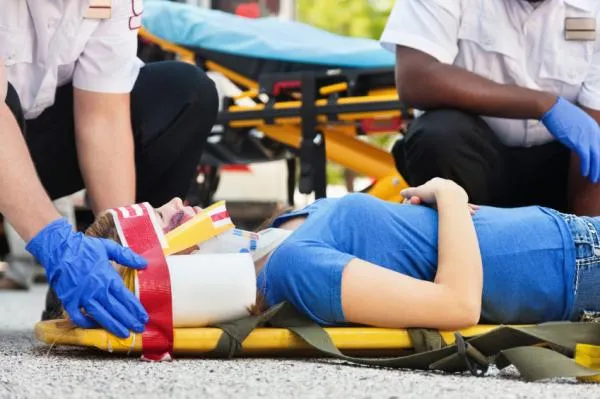Both the muscles and sensory pathways below the injury are destroyed. This condition can affect anyone at any age, regardless of the severity of the injury. Scientists are optimistic that research will someday repair spinal cord injuries possible. Research is ongoing worldwide, and treatments allow many people with spinal cord injuries to lead productive, independent lives in the meantime.

How to determine spinal cord injury?
What are the signs of a spinal injury? Spinal cord injuries can be tricky to identify and diagnose, but there are many tell-tale symptoms. Headaches or neck pain could indicate nerve damage in the spine, while any difficulty with urination is also indicative. Most importantly, though, if you’ve experienced significant trauma such as being hit by an oncoming vehicle, use extreme caution. If you’re unsure whether your condition might warrant emergency care, seek professional medical attention immediately for proper diagnosis and treatment advice.
How spinal cord injury happens?
Injuries that affect the spine are often a result of accidents. When an object strikes your back, it can tear into any part of you and cut off essential nerves in your spinal cord to different parts of the body, causing paralysis or loss of feeling in corresponding limbs.
Can spinal cord injury be cured?
Researchers are still unsure of how to cure spinal cord injury, but there may be hope. There is no known cure for spinal cord injuries yet, and research has been limited due to lack of funding.
The human spine consists of 33 vertebrae that protect the brain from impacts to the head. The cells in each segment get injured regularly, but there’s no way for those cells to heal themselves, so it’s crucial they stay covered by muscular cartilage tissue when healthy or else risk further damage.
Spinal cord injury symptoms
Your ability to control your limbs after a spinal cord injury may depend on two factors: the place of the injury along your spinal cord and the level of injury.
A neurologist will often refer to the lowest point of your spinal injury as being at a certain neurological level. The severity is categorized either as complete or incomplete depending on how much damage was done in the incident that caused it.
When examining an individual with a severe back, neck, or head trauma and determining their prognosis for recovery from paralysis after surgery, there are two critical things to consider: what type of injury they experienced (complete versus incomplete) and whether other parts of their body were injured during the event which may have later affected another area such as feeling sensation below one’s waist if both legs suffered injuries, but only one leg recovered mobility.
There are two types of spinal cord injury:
- Complete injury – A complete injury is one in which there is no motor function or sensory function below the affected area. An incomplete injury means that some essential functions exist, but not all of them. There are varying degrees of injuries, from mild nerve damage to severe. Each case must be addressed accordingly and with care by medical professionals like an orthopedic surgeon who will know how to help you recover fully so your life can go back to normal again.
- Incomplete injury – An insufficient spinal cord trauma may result in partial loss of sensation without any paralysis. In contrast, a complete spinal column surgery would render both sensations lost completely because it has severed off contact between nerves on opposite sides at its epicenter due to the impact (or other causes).
Spinal cord injury vital signs
The human spinal cord is a part of the central nervous system. Damage to this vital structure can lead to paralysis, incontinence, and lack of control over bowel movements or bladder function.
Emergency doctors are trained to diagnose these injuries, which can be life-threatening if not treated quickly enough with surgery.
Symptoms most often seen after injury include localized pain at the site where damage has occurred, numbness around that region, difficulty walking without assistance from others because sensation may have been lost below the injured area on one side, as well as weakness in muscles controlled by spinal nerves. In any case, you may consider contacting an Atlanta injury lawyer for assistance.
Spinal cord injury complications
Your rehabilitation team will help you through the process of getting your body back on track. This includes developing new tools to compensate for any changes in how it functions, such as adapting equipment and resources that promote quality of life and independence after a spinal cord injury.
Some things that may be changed due to an SCI are: bowel function, bladder control, sexual functioning/orgasmic response (or lack thereof), sensation throughout the lower extremities or torso area; overall strength when injured at higher levels can result in limitations regarding mobility aids – like wheelchairs which might not provide enough support without additional modifications made by one’s rehab team specifically catering those needs.
- Bladder control – Let’s say you have the bladder of a baby in that it can be made to hold much more than usual without leaking. The changes due to spinal cord injury may even make your kidney infections worse because they cannot release urine like usual and are left with little option – surgery when urinary tract infection occurs.
- Bowel control – Although your stomach and intestines work much like they did before you got injured, the degree of which is still unclear to medical professionals, there are side effects that result from this, such as bowel issues. A high-fiber diet can help regulate these problems. Still, one must also learn techniques for optimizing their bowels during rehabilitation to live a healthy life with less stress on the body’s other systems to compensate for unbalanced waste elimination.
- Skin sensation – In the neurological level below your injury, you may have lost part of all skin sensations. This means that when it’s injured by certain things such as prolonged pressure, heat, or cold, it can’t send a message to your brain and tell you about its pain anymore! So make sure to change positions often with help if needed because this could be more susceptible for areas of high pressure like sores from sitting too long.
- Circulatory control – The circulatory system is a complex yet delicate blood vessel network that transfers oxygen and nutrients to the body’s tissues. It can also be affected by injury or illness in ways both subtle and drastic. As you read this article on spinal cord injuries, consider how they affect not only mobility disorders but your entire circulation system as well.
- Respiratory system – The respiratory system is an essential part of your body that helps you breathe. It can be challenging to manage if damaged, but luckily there are many different ways to happen. The type of injury will determine what kind of symptoms do or don’t occur, so it’s a good idea to make sure that at least some basic level knowledge is available for each person on how they might react should their condition worsen.
- The muscle tone with spinal cord injury can be uncontrolled, causing spasticity or lack of luster and limp muscles. Spasticity and flaccidity are two common complaints of those with spinal cord injuries. Spasticity is characterized by muscle tightening or uncontrolled motion, while flaccid muscles lack tone and maybe soft to the touch.
- Sexual health is one of the few areas that can be affected by spinal cord injuries. Men may notice changes in erection and ejaculation, while women might experience a lack of lubrication during sex. Sexual dysfunction specialists can offer options for sexual functioning and fertility treatments depending on what you need help with.
- Depression – Depression can be a massive challenge for those who experience spinal cord injuries because of all the changes in one’s life and body. It is also common among people living with chronic pain, which only adds more pressure on you mentally day by day.
Common causes of spinal cord injuries
The list of common causes for spinal cord injuries is long and varied. They include:
- Motor vehicle accidents
- Falls from heights or trees
- Sports-related trauma like football concussions in the NFL (National Football League)
- Trucking accidents where a person was thrown into the windshield during an accident
- Workers being hit by objects on construction sites when they are not wearing safety gear such as hard hats or goggles
- People who have been injured due to medical malpractice at their doctor’s office if procedures were done incorrectly that led to paralysis
- Cases involving sexual assault can be highly traumatic injuries and lead to post-traumatic stress disorder and depression, among other mental illnesses.
All these different injuries have in common is that it takes only one event to injure someone.
Singleton Law Firm LLC. gives you the in-depth research and strategic prowess needed to find a solution for your legal problem. You can contact one of our personal injury lawyers today for a free case evaluation!
